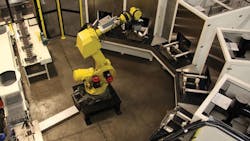Raising the Bar for Commercial Vacuum Impregnation
Late in 2009 a team of manufacturing engineers from a Japanese OEM met to review their latest powertrain project, a new four-cylinder engine to be used in one of the company’s strongest selling platforms. The manufacturing plan was to integrate vertically — from casting to assembly — and the cylinder block casting was of particular concern.
Based on experience the team knew the leak-test requirements would be difficult to meet without vacuum impregnation, but their experience also led them to believe suppliers of impregnation services were short on effective solutions. Traditional basket “batching” systems would not integrate into the modern assembly plant, and their failure modes (part damage, contamination) and excessive manpower requirements prevented them from being considered.
Modified, automated batch systems running smaller loads that could meet the zero-manpower requirements could not achieve the specified sealing rates and floor space requirements. Outsourcing proved far too expensive and risky. The OEM’s options were limited.
Today, a lean vacuum impregnation system is providing significant economic benefits for that Japanese OEM in the U.S. The Continuous Flow Impregnation (CFi) system, from Godfrey & Wing, was installed as part of the fully automated engine manufacturing line and seals (impregnates) a single aluminum cylinder block in less than 98 seconds. While the efficient cycle time allows for complete integration on the machining line, the effectiveness of this proprietary impregnation process has delivered a First Time Through (FTT) acceptance rate of over 99%.
The operational savings realized from the CFi versus traditional or modified impregnation equipment has been demonstrated to be in excess of $1.1 million per year.
The CFi has raised the bar in the vacuum impregnation industry to new levels. Combining efficient cycle times with excellent sealing performance (guaranteed to seal micro porosity) and high-performance post-impregnation cleaning, the CFi provides a lower unit cost per block along with tangible environmental benefits. In addition, the CFi operates without direct labor, significantly lowering the hours/unit production cost — a key metric to any automotive OEM.
The CFi system takes a single fully machined cylinder block straight from the production line and using a robot, automatically passes it through a four-stage vacuum impregnation process. The process components are a Dry Vacuum Pressure (DVP) impregnation chamber using a low viscosity sealant, a centrifuge to recover surplus sealant, a water wash/rinse stage and a hot water cure stage to solidify the sealant inside the casting porosity.
As a result of this very effective process, impregnated cylinder blocks are impervious to the passage of gas or liquids that otherwise could result in leakage during service, leading to engine failure and expensive recalls.
Capable of operating 24 hours per day, seven days per week across three shifts and producing over 220,000 cylinder blocks per year, the CFi is an integral part of the OEM’s operation.
A feature of the CFi system is the ability to process singular parts such as cylinder heads, blocks, transmission cases or trays of smaller parts such as fuel injection pumps, air conditioning compressors and power steering housings in just a few seconds. This benefits handling and a seamless integration with other manufacturing operations, as well as requiring significantly less floor space than conventional impregnation systems.
Developed in 2001 for a General Motors powertrain project, the patented Godfrey & Wing CFi technology continues to deliver results that previously had been unattainable in the field of vacuum impregnation. The original goal was to replace obsolete batching systems with a system that could be integrated into a machining line. The results surpassed all expectations. Single-piece flow process integration was achieved, but also parts sealed at a rate that was 16 points higher than the best batch technology. In addition, parts were clean and free of contamination without any handling or process damage.
The CFi technology has continued to evolve and improve: now, it is processing powertrain components at every major domestic and Japanese automaking OEM.
Learn more about CFI at www.godfreywing.com
For more on Finishing/MRO, click here.
